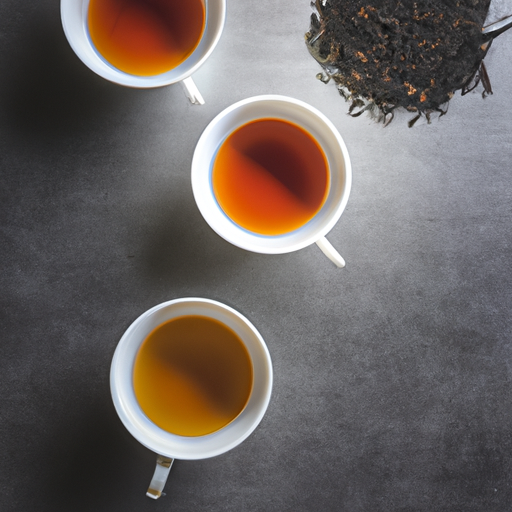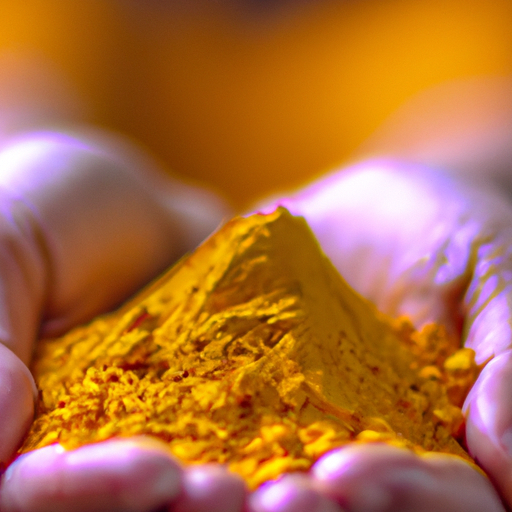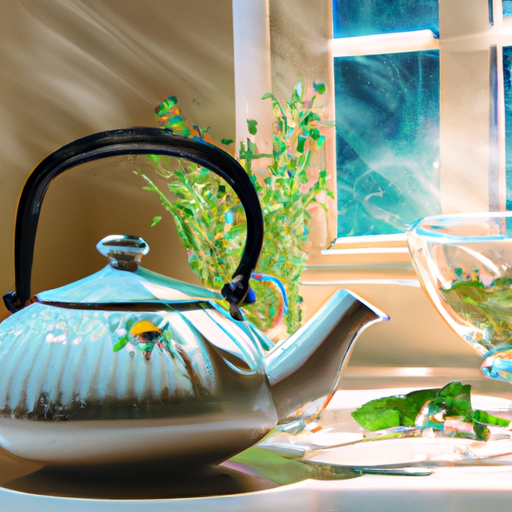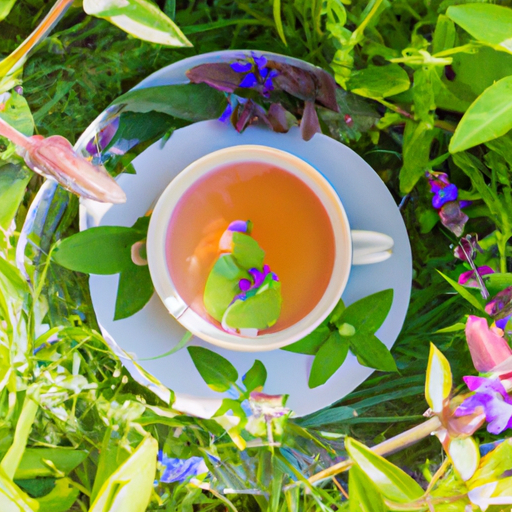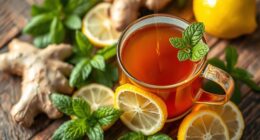Black tea, the dark elixir that awakens the senses and soothes the soul, has captivated tea enthusiasts for centuries. Its rich, robust flavor and invigorating aroma make it a beloved beverage worldwide. Yet, amidst the vast array of herbal teas that grace our teacups, black tea stands alone as a distinguished entity.
It is an enigma, defying categorization as an herbal tea. But why? In this article, we delve into the depths of black tea, unraveling its secrets and shedding light on its unique nature. From its intricate production process to its chemical composition, we explore the factors that differentiate black tea from its herbal counterparts.
Join me on this journey as we uncover the cultural significance, health benefits, and diverse varieties of black tea. Prepare to be captivated by the world of black tea, where tradition meets innovation and complexity intertwines with simplicity.
Key Takeaways
- Black tea is distinguished from herbal teas due to its unique characteristics and the production process it undergoes, including oxidation, withering, rolling, and drying.
- Black tea contains specific chemical compounds like polyphenols, catechins, and flavonoids, which contribute to its taste and health benefits, while herbal teas lack these compounds.
- Herbal teas have their own specific health benefits and cultural significance, but they do not possess the same chemical composition as black tea.
- Black tea has a rich history and cultural significance, symbolizing hospitality and social bonding, and it has numerous health benefits, including reducing inflammation, protecting against heart disease and certain cancers, and improving blood vessel function.
Understanding the Production Process of Black Tea
So, you’re probably wondering how exactly black tea is made, right? Well, let me break it down for you.
The production of black tea involves a process called oxidation. This process plays a crucial role in determining the flavor and color of the tea.
After the leaves are harvested, they undergo withering, where they are spread out and left to dry. This step allows the leaves to lose moisture and become more pliable for the next stage. The withering process also helps to initiate the oxidation process by breaking down enzymes in the leaves.
Once withering is complete, the leaves are rolled, which further enhances oxidation. As the leaves are rolled, their cell walls rupture, allowing the tea’s natural chemicals to mix and react with oxygen. This reaction is what gives black tea its distinct flavor and color.
It’s fascinating to see how these simple steps can transform fresh tea leaves into a rich, flavorful beverage.
Now, let’s explore the chemical composition of black tea.
Exploring the Chemical Composition of Black Tea
Explore the fascinating chemical makeup of black tea and discover why it differs from herbal tea.
Black tea is known for its rich flavor and deep color, which is a result of its unique chemical composition. It contains a variety of chemical compounds, including polyphenols, catechins, and flavonoids, which contribute to its distinct taste and health benefits. These compounds not only give black tea its characteristic flavor but also have antioxidant properties that can help protect the body against damage from free radicals.
The chemical composition of black tea is also influenced by the brewing techniques used. The leaves of the Camellia sinensis plant, which are used to make black tea, undergo a process of oxidation. This oxidation process leads to the formation of different chemical compounds, such as theaflavins and thearubigins, which are responsible for the robust and full-bodied flavor of black tea.
While black tea shares some similarities with herbal tea in terms of brewing techniques, the chemical composition sets them apart. Herbal teas are typically made from the infusion of various plant materials, such as flowers, leaves, and roots. Unlike black tea, herbal teas do not come from the Camellia sinensis plant and therefore lack the chemical compounds found in black tea.
Transitioning to the next section, it’s clear that the chemical composition of black tea plays a significant role in differentiating it from herbal tea.
Differentiating Black Tea from Herbal Tea
One key distinction between black tea and herbal tea lies in their respective chemical compositions, which significantly differentiate them from one another.
Black tea is made from the leaves of the Camellia sinensis plant, which undergoes a process of withering, rolling, oxidation, and drying. This process results in the characteristic dark color and robust flavor of black tea.
On the other hand, herbal tea is not made from the leaves of the Camellia sinensis plant but instead consists of various herbs, flowers, fruits, and spices. These ingredients are often chosen for their specific health benefits and flavors.
Understanding the health benefits of herbal tea is important when differentiating it from black tea. Herbal teas can provide a range of benefits depending on the ingredients used. For example, chamomile tea is known for its calming properties, while peppermint tea can aid digestion. These herbal teas are often consumed for their therapeutic effects and are popular choices for those seeking natural remedies.
Exploring the cultural significance of herbal tea further highlights its distinction from black tea. Herbal teas have a long history of use in different cultures around the world. For instance, in traditional Chinese medicine, certain herbal teas are believed to restore balance and promote well-being. In Ayurveda, the traditional medicine system of India, herbal teas are used to support various aspects of health and vitality.
Transitioning into the subsequent section about the cultural significance of black tea, it’s important to note that black tea also has a rich history and cultural significance in many countries.
Cultural Significance of Black Tea
Discover the rich cultural significance of black tea and how it’s been cherished by tea enthusiasts around the world. Black tea holds a special place in the hearts of many cultures, as it’s not only a beverage but also an integral part of cultural rituals and traditions. Its historical significance can be traced back centuries, with origins in China and later spreading to other parts of the world.
In many countries, black tea has been a symbol of hospitality and a means of social bonding. In England, for example, the afternoon tea ceremony became a cherished tradition in the 19th century, where black tea was served alongside delicate pastries and sandwiches. In India, black tea holds cultural importance through the renowned chai tea, a spiced black tea often served with milk. Chai is not only a beverage but also a way of bringing people together and fostering connections.
Black tea has also played a role in historical events, such as the Boston Tea Party in the United States, where colonists protested against British taxation by dumping chests of black tea into the harbor. This event marked a turning point in American history and fueled the fight for independence.
Transitioning into the subsequent section about the health benefits of black tea, it’s fascinating to explore how this beloved beverage not only has cultural value but also offers numerous advantages for our well-being.
Health Benefits of Black Tea
Indulging in a cup of black tea can have a surprising impact on your overall health – did you know that it contains powerful antioxidants that can help reduce the risk of chronic diseases?
Black tea is packed with health benefits that make it a popular choice among tea enthusiasts. One of the key benefits is its high concentration of antioxidants called polyphenols, which have been linked to reducing inflammation and protecting against heart disease and certain types of cancer. It also contains catechins, which help improve blood vessel function and reduce the risk of cardiovascular problems.
In addition to its antioxidant properties, black tea can also boost your immune system and improve digestion. It contains compounds called tannins, which have antimicrobial and anti-inflammatory effects that can help fight off infections and promote a healthy gut. Moreover, black tea has been shown to enhance mental alertness and cognitive function due to the presence of caffeine and an amino acid called L-theanine. This combination can improve focus, concentration, and overall brain performance.
To fully enjoy the health benefits of black tea, it’s important to brew it correctly. The brewing technique can affect the taste and potency of the tea. Generally, black tea leaves should be steeped in hot water for around 3-5 minutes to release its flavors and antioxidants. However, different varieties may require slight variations in brewing time and temperature. Experimenting with brewing techniques can help you find the perfect balance of flavors and maximize the health benefits of black tea.
As we delve into popular varieties of black tea, we will discover a world of diverse flavors and aromas that will surely captivate your taste buds.
Popular Varieties of Black Tea
Sentence:
Savor the enchanting flavors and delightful aromas of popular varieties of black tea.
Black tea comes in a wide range of delicious flavors and is produced by various popular brands. One of the most well-known black tea brands is Twinings, which has been producing high-quality teas since 1706. Their black tea blends, such as English Breakfast and Earl Grey, are loved by tea enthusiasts worldwide. Another popular brand is Lipton, known for its bold and robust black tea that can be enjoyed both hot and iced. Additionally, Harney & Sons offers a wide selection of black teas, including their popular blends like Paris and Hot Cinnamon Spice.
The history of black tea is fascinating and dates back centuries. Originally discovered in China, black tea quickly gained popularity in Europe during the 17th century. It became a sought-after commodity and played a significant role in trade between China and the Western world. The British East India Company played a pivotal role in introducing black tea to Britain, where it became a staple beverage.
Now, let’s explore blends and flavored black teas, where the exquisite flavors of black tea are elevated with the addition of various ingredients and aromas.
Exploring Blends and Flavored Black Teas
Now that we’ve explored the popular varieties of black tea, let’s delve into the exciting world of blends and flavored black teas. These unique teas offer a delightful twist to the traditional black tea experience.
Blends combine different types of black tea or even other tea varieties to create a harmonious balance of flavors. For instance, a blend might incorporate Darjeeling, Assam, and Ceylon teas to create a rich and complex taste.
Flavored black teas take this a step further by infusing additional ingredients such as fruits, flowers, or spices into the tea leaves. This infusion process imparts a distinct flavor profile that can range from fruity and floral to spicy and aromatic. Some popular flavored black teas include Earl Grey, which is infused with bergamot oil, and Chai, which is spiced with cinnamon, cardamom, and ginger.
To fully enjoy the flavors of these blends and flavored black teas, it’s important to use the right brewing techniques. The water temperature, steeping time, and tea-to-water ratio can greatly influence the taste and aroma of the final cup. Experimenting with different brewing methods will allow you to discover your preferred way of enjoying these delightful teas.
- Blends combine different types of black tea to create a harmonious balance of flavors.
- Flavored black teas infuse additional ingredients such as fruits, flowers, or spices into the tea leaves.
- Earl Grey is a popular flavored black tea infused with bergamot oil.
- Chai is a spiced black tea that incorporates cinnamon, cardamom, and ginger.
Frequently Asked Questions
What is the caffeine content in black tea compared to herbal tea?
Compared to herbal tea, black tea has a higher caffeine content. It provides a natural boost, like a burst of energy in the morning. Additionally, black tea offers numerous health benefits, such as improved heart health and antioxidant properties.
Can black tea be blended with herbs to create a herbal tea?
Yes, black tea can be blended with herbs using various blending techniques. By incorporating alternative ingredients such as chamomile, mint, or lavender, a flavorful and aromatic herbal tea can be created.
Are there any cultural practices or rituals associated with black tea?
Black tea has a significant cultural significance in many countries, particularly in Asia. It is often used in tea ceremonies, which are elaborate rituals that involve the preparation, serving, and drinking of tea.
Does black tea provide the same health benefits as herbal tea?
Black tea offers a range of health benefits, including improved heart health and reduced risk of stroke. While it differs from herbal tea, it can still aid in weight loss and provide similar benefits as green tea.
Are there any flavored black teas that are considered herbal?
Yes, there are flavored black teas that are considered herbal. Some examples include black teas infused with fruits, flowers, or spices. These blends combine the flavors of black tea with the health benefits of different types of herbal teas.
Conclusion
In conclusion, black tea is a distinct type of tea that is not considered herbal tea due to its unique production process and chemical composition.
It is fascinating to note that black tea is the most consumed tea worldwide, accounting for about 78% of all tea consumption. This statistic highlights the immense popularity and love for black tea among people around the globe.
With its rich cultural significance, health benefits, and a wide range of varieties, black tea continues to be a beloved beverage for many.

